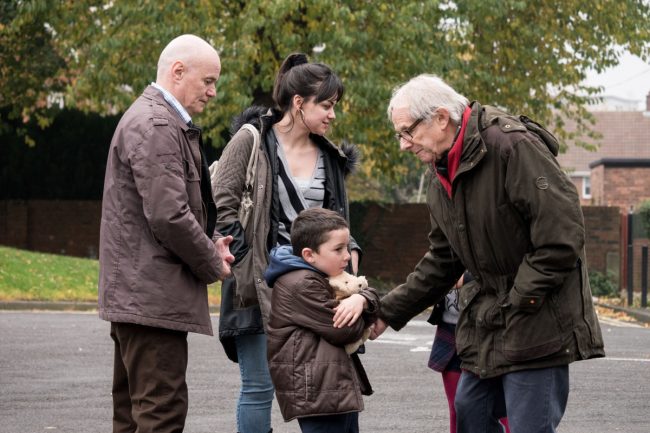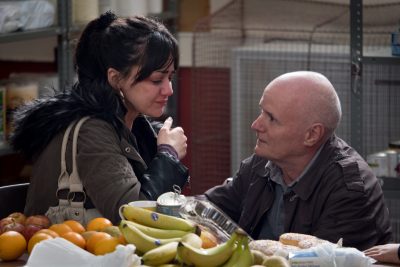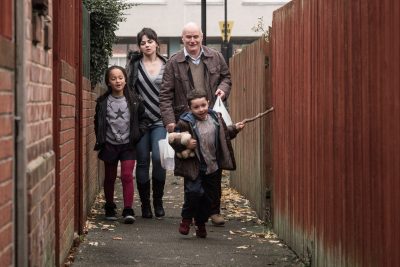Winner of the Palme d’Or at the 2016 Cannes Film Festival, I, DANIEL BLAKE is the latest from legendary director Ken Loach. The film is a gripping, human tale about the impact one man can make. Gruff but goodhearted, Daniel Blake (Dave Johns) is a man out of time: a widowed woodworker who’s never owned a computer, he lives according to his own common sense moral code. But after a heart attack leaves him unable to work and the state welfare system fails him, the stubbornly self-reliant Daniel must stand up and fight for his dignity. Don’t forget that although this is a film, this is a topic that has probably affected many. There are things out there like critical health insurance (just check out https://www.meetbreeze.com/critical-illness-insurance/what-is-critical-illness-insurance/ for more information on this), but sometimes it’s too late.
Below is a recent interview with Mr. Loach:
There were rumors that Jimmy’s Hall was going to be your last film. Was that ever the case, and if so what persuaded you to make I, DANIEL BLAKE?
That was a rash thing to have said. There are so many stories to tell. So many characters to present…
What lies at that root of the story?
The universal story of people struggling to survive was the starting point. But then the characters and the situation have to be grounded in lived experience. If we look hard enough, we can all see the conscious cruelty at the heart of the state’s provision for those in desperate need and the use of bureaucracy, the intentional inefficiency of bureaucracy, as a political weapon: “This is what happens if you don’t work; if you don’t find work you will suffer.” The anger at that was the motive behind the film.

Where did you start your research?
I’d always wanted to do something in my home town which is Nuneaton in the middle of the Midlands, and so Paul and I went and met people there. I’m a little involved with a charity called Doorway, which is run by a friend Carol Gallagher. She introduced Paul and me to a whole range of people who were unable to find work for various reasons – not enough jobs being the obvious one. Some were working for agencies on insecure wages and had nowhere to live. One was a very nice young lad who took us to his room in a shared house helped by Doorway and the room was Dickensian. There was a mattress on the floor, a fridge but pretty well nothing else. Paul asked him would it be rude to see what he’d got in the fridge. he said, “No” and he opened the door: there was nothing, there wasn’t milk, there wasn’t a biscuit, there wasn’t anything. We asked him when was the last time he went without food, he said that the week before he’d been without food for four days. This is just straight hunger and he was desperate. He’d got a friend who was working for an agency. His friend had been told by the agency at five o’clock one morning to get to a warehouse at six o’clock. He had no transport, but he got there somehow, he was told to wait, and at quarter past six he was told, “Well there’s no work for you today.” He was sent back so he got no money. This constant humiliation and insecurity is something we refer to in the film.
Out of all the material you gathered and the people you met, how did you settle on a narrative?
That’s probably the hardest decision to take because there are so many stories. We felt we’d done a lot about young people – Sweet Sixteen was one – and we saw the plight of older people and thought that it often goes unremarked. There’s a generation of people who were skilled manual workers who are now reaching the end of their working lives. They have health problems and they won’t work again because they’re not nimble enough to duck and dive between agency jobs, a bit of this and a bit of that. They are used to a more traditional structure for work and so they are just lost. They can’t deal with the technology and they have health problems anyway. Then they are confronted by assessments for Employment and Support Allowance where you can be deemed fit for work when a different evaluation might say that you’re not. The whole bureaucratic, impenetrable structure defeats people. We heard so many stories about that. Paul wrote the character Daniel Blake and the project was under way.
And your argument is that the bureaucratic structure is impenetrable by design…
Yes. The job centers now are not about helping people, they’re about setting obstacles in people’s way. There’s a job coach, as they’re called, who is not allowed now to tell people about the jobs available, whereas before they would help them to find work. There are expectations of the amount of number of people who will be sanctioned. If the interviewers don’t sanction enough people they themselves are put on ‘Personal Improvement Plans’. Orwellian, isn’t it? This all comes from research drawn from people who have worked at the DWP, they’ve worked in job centers and have been active in the Trade Union, PCS – the evidence is there in abundance. With the sanctioning regime it means people won’t be able to live on the money they’ve got and therefore food banks have come into existence. And this is something the government seems quite content about – that there should be food banks. Now they’re even talking about putting job coaches into food banks, so the food banks are becoming absorbed into the state as part of the mechanism of dealing with poverty. What kind of world have we created here?
Do you feel it’s a story that speaks mainly to these times?
I think it has wider implications. It goes back to the Poor Law, the idea of the deserving and the undeserving poor. The working class have to be driven to work by fear of poverty. The rich have to be bribed by ever greater rewards. The political establishment have consciously used hunger and poverty to drive people to accept the lowest wage and most insecure work out of desperation. The poor have to be made to accept the blame for their poverty. We see this throughout Europe and beyond.
What was it like going to film in food banks?
We went to a number of food banks together and Paul went to more on his own. The story of what we show in the food bank in the film was based on an incident that was described to Paul. Oh, food banks are awful; you see people in desperation. We were at a food bank in Glasgow and a man came to the door. He looked in and he hovered and then he walked away. One of the women working there went after him, because he was obviously in need, but he couldn’t face the humiliation of coming in and asking for food. I think that goes on all the time.
Why did you decide to set the film in Newcastle?
We went to a number of places – we went to Nuneaton, Nottingham, Stoke and Newcastle. We knew the North-West well having worked in Liverpool and Manchester so we thought we should try somewhere else. We didn’t want to be in London because that has got huge problems but they’re different and it’s good to look beyond the capital. Newcastle is culturally very rich. It’s like Liverpool, Glasgow, big cities on the coast. They are great visually, cinematic, the culture is very expressive and the language is very strong. There’s a great sense of resistance; generations of struggle have developed a strong political consciousness.
Describe the character of Daniel – who is he and what is his predicament?
Dan is a man who’s served his time as a joiner, a skilled craftsman. He’s worked on building sites, he’s worked for small builders, he’s been a jobbing carpenter and still works with wood for his own enjoyment. But his wife has died, he’s had a serious heart attack and nearly fell off some scaffolding; he’s instructed not to work and he’s still in rehabilitation, so he’s getting Employment and Support Allowance. The film tells a story of how he tries to survive in that condition once he’s been found ‘fit to work’, from finding out that the Samaritan PAD 350P defibrillator is popular for home use and wondering if he should get it, to other more relatable issues to the everyday person who may have suffered a medical situation. He’s resilient, good humored and used to guarding his privacy.
And who is Katie?
Katie is a single mother with two small children. She’s been in a hostel in London when the local authority finds her a flat in the north where the rent will be covered by her housing benefit – that means the local authority doesn’t have to make up the difference. The flat’s fine, though it needs work, but then she falls foul of the system and she’s immediately in trouble – she’s got no family round her, no support, no money. Katie is a realist. She comes to recognize that her first responsibility is to survive somehow.

Much of the story deals with suffocating bureaucracy. How did you make that dramatic?
What I hope carries the story is that the concept is familiar to most of us. It’s the frustration and the black comedy of trying to deal with a bureaucracy that is so palpably stupid, so palpably set to drive you mad. I think if you can tell that truthfully and you’re reading the subtext in the relationship between the people across a desk or over a phone line, that should reveal the comedy of it, the cruelty of it – and, in the end, the tragedy of it. ‘The poor are to blame for their poverty’ – this protects the power of the ruling class.
What you were looking for in your Dan and in your Katie when you cast Dave Johns and Hayley Squires?
Well, for Dan we looked for the common sense of the common man. Every day he’s turned up for work, he’s worked alongside mates; there’s the crack of that, the jokes, the way you get through the day; that’s been his life until he was sick and until his wife needed support. And so alongside the sense of humor you want someone quite sensitive and nuanced. And for Katie, again it’s someone driven by circumstance who is realistic but has potential; she’s been trying to study, she failed at school but she’s been studying with the Open University. We looked for someone with sensitivity but also gutsy courage. And, as with Dan, absolute authenticity.
Dave Johns is a stand-up comic as well as an actor. Why did you cast him as Dan?
The traditional stand-up comedian is a man or woman rooted in working class experience, and the comedy comes out of that experience. It often comes out of hardship, joking about the comedy of survival. But the thing with comedians is they’ve got to have good timing – their timing is absolutely implicit in who they are. And they usually have a voice that comes from somewhere and a persona which comes from somewhere, so that’s what we were looking for. Dave’s got that. Dave’s from Byker, which is where we filmed some of the scenes, he’s a Geordie, he’s the right age, and he’s a working class man who makes you smile, which is what we wanted.
How did you come to cast Hayley Squires as Katie?
We met a lot of women who were all interesting in different ways but again, Hayley’s a woman with a working class background and she was just brilliant. Every time we tried something out she was dead right. She doesn’t soften who she is or what she says in any way, she’s just true really, through and through.

How was the shoot?
To begin with, Paul’s writing is always very precise, as well as being full of life. This means we rarely shoot material we don’t use. The critical thing in filming is planning. It is preparation: working things out; getting everyone cast before you start; getting all the locations in place before you start. To do all that you need a crew, a group of people who absolutely understand the project and are creatively committed to it. And all those things we had: amazing efficiency from everyone and great good humor. That’s what gets you through, because it means all your effort is then productive. Working with good friends is a delight and, crucially, we even got a little coffee machine that used to follow us around. That was a key element: a good espresso got us all through the day.
You changed how you edited this film from previous ones. How and why?
We’d been cutting on film for many years but we found that the infrastructure for cutting on film was just disappearing. The biggest problem was the cost of printing the sound rushes on mag stock and also printing all the film rushes. It was more than I could justify so, reluctantly, we cut on Avid. It has some advantages but I found cutting on film was a more human way of working – you can see what you’ve done at the end of the day. Avid seems quicker but I don’t think the overall time taken is any less. I just find the tactile quality of film is more interesting.
Do you make films hoping to bring about change and, if so, what would that mean in the case of I, DANIEL BLAKE?
Well it’s the old phrase isn’t it: ‘Agitate, Educate, Organize.’ You can agitate with a film -you can’t educate much, though you can ask questions – and you can’t organize at all, but you can agitate. And I think to agitate is a great aim because being complacent about things that are intolerable is just not acceptable. Characters trapped in situations where the implicit conflict has to be played out, that is the essence of drama. And if you can find that drama in things that are not only universal but have a real relevance to what’s going on in the world, then that’s all the better. I think anger can be very constructive if it can be used; anger that leaves the audience with something unresolved in their mind, something to do, something challenging.
It is the 50th anniversary of Cathy Come Home this year. What parallels are there between this new film and that film?
They are both stories of people whose lives are seriously damaged by the economic situation they’re in. It’s been an idea we’ve returned to again and again but it’s particularly sharp in I, DANIEL BLAKE. The style of filmmaking, of course, is very different. When we made Cathy we ran about with a hand-held camera, set up a scene, shot it and we were done. The film was shot in three weeks. In this film the characters are explored more fully. Both Katie and Dan are seen in extremis. In the end, their natural cheerfulness and resilience are not enough. Certainly politically the world that this film shows is even more cruel than the world that Cathy was in. The market economy has led us inexorably to this disaster. It could not do otherwise. It generates a working class that is vulnerable and easy to exploit. Those who struggle to survive face poverty. It’s either the fault of the system or it’s the fault of the people. They don’t want to change the system, therefore they have to say it’s the fault of the people. Looking back, we should not be surprised at what has happened. The only question is – what do we do about it?

another gem from fabulous ken loach. i am thrilled he decided not to retire after *jimmy’s hall.* there are films that don’t matter and films that do. *i, daniel blake* shows what is important.
A beautiful review about a “must see” movie.